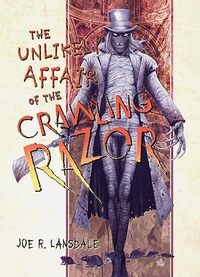The Return of Ellie Black by Emiko Jean
 Monday, April 29, 2024 at 6:52AM
Monday, April 29, 2024 at 6:52AM 
Published by Simon & Schuster on May 7, 2024
Like most crime novels, The Return of Ellie Black fails to live up to its marketing hype. This is nevertheless the kind of novel that certain readers seem to crave. It is the story of a serial kidnapper of teenage (or younger) girls. The villain brutalizes, brainwashes, rapes, and eventually kills his victims — apart from Ellie Black. Serial kidnappers, like serial killers, are far more prevalent in the world of crime fiction than they are in the real world, but the market for child snatching stories never seems to be saturated.
Michael and David apparently work together to kidnap teenage girls (and at least one preteen). Assisted by a woman named Serenity, they hold the girls in a buried bus for two weeks to break down their sense of identity. Some of the girls apparently starve to death before they forget who they are. The men give the survivors names like Faith and Hope. They hold the girls captive, using them as their sex slaves with the apparent aim to make them pregnant.
The story departs from the formula when a kidnap victim is found alive. Ellie Black has been missing for two years. She turns up in the woods in a shattered emotional state. Ellie is not cooperative with the police, a fact that the police attribute to her unwillingness to revisit her trauma. Yet there may be another cause of her reticence, which proves to be the only interesting aspect of a novel that is otherwise formulaic.
Most of the story is told in the third person as it follows Detective Chelsey Calhoun and her investigation of Ellie’s kidnapping. An article of clothing Ellie is wearing links her to a couple of other missing females. A few scattered chapters are told in the first person as Ellie recalls her ordeal.
Emiko Jean gives us the usual theme of a police detective who thinks “If only these [missing] girls could talk” and imagines them whispering “Find us, please.” Some readers seem to have an appetite for obvious efforts to manipulate their sympathies. Sometimes the mention of the word “victim” is enough to draw them into the story.
Fictional female detectives like Calhoun — dedicated to victims, unable to sleep because they are haunted by the victims’ voices, who “will do anything to save a life” — are ubiquitous in crime fiction. They are usually one dimensional. “Just think of the victims” becomes a substitute for a writer’s inability to think of interesting characters. Jean is no exception in that flawed approach to crime fiction writing. I usually avoid stories of that nature but the marketing hype made me think this one might be different. It isn’t.
Calhoun’s insecurity, followed by her eventual triumph, is another part of the formula. Also formulaic is Calhoun’s motivation for becoming a cop — a missing and murdered sister — and Calhoun’s self-recrimination because she didn’t prevent her sister from dating the wrong guy. Have you heard this story before? If you read enough crime fiction, you’ve encountered it over and over.
Another tired cliché of thriller writing is Calhoun’s boss, who takes credit for her successes and blames her for failures that weren’t entirely her fault. And, of course, Calhoun makes predictable decisions to defy authority and do what’s necessary because she just cares so much about victims. Victims are more important than her job or her relationships or anything else because victims.
Ellie has a dark secret that makes her feel guilty. It can’t be too dark because the reader is meant to sympathize with Ellie, even when she does something awful. The true reason for Ellie’s failure to cooperate with the investigation ties into the secret. It isn’t at all credible, but it is at least a departure from the formula.
Jean’s prose style is acceptable and she tells the story with good pace. The reveal of a kidnapper’s true identity is standard thriller fare — contrived and unsurprising. The villains are caricatures of evil men with mommy issues. The story’s positive qualities permit a tepid recommendation, but its familiarity prevents me from recommending it to anyone who doesn’t crave stories that feature detectives who can’t stop talking about how much they care about victims.
RECOMMENDED WITH RESERVATIONS



